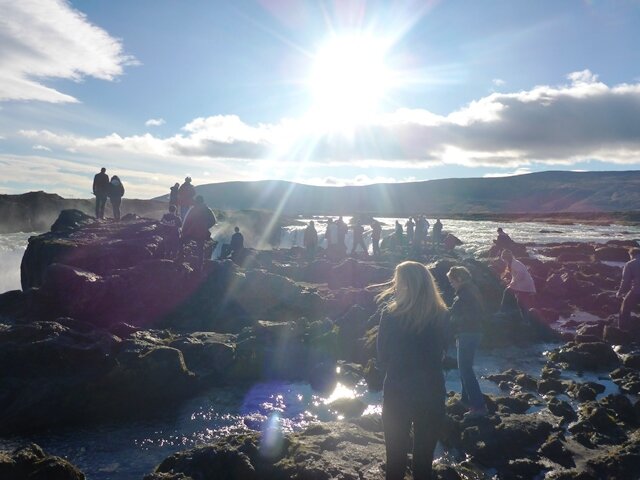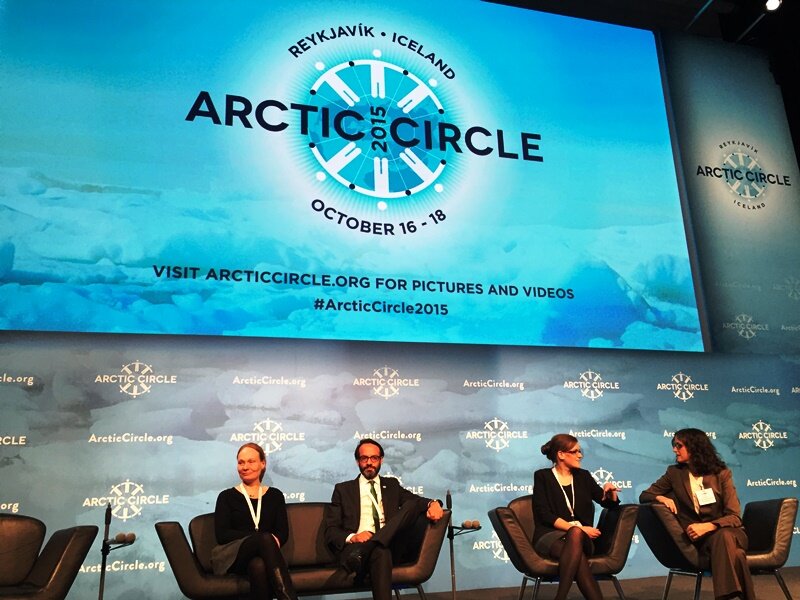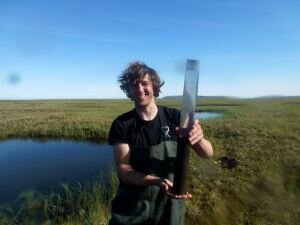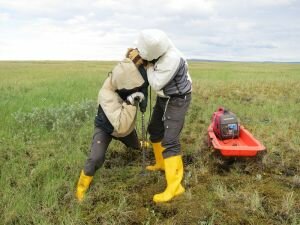PAGE21 Researcher Profiles: Shushi Peng
- Details
- Created on Thursday, 21 February 2013 12:56
Representing the modeler side of the permafrost research we present this week Shushi Peng from the Laboratoire de Glaciologie et Géophysique de l'Environnement (LGGE)/Laboratoire des Sciences du Climat et de l'Environnement (LSCE/IPSL) in France.
Name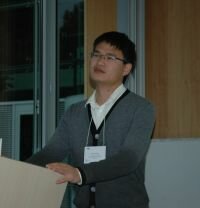
Shushi PENG
Institution
Laboratoire de Glaciologie et Géophysique de l'Environnement (LGGE)/Laboratoire des Sciences du Climat et de l'Environnement (LSCE/IPSL), France
Nationality
Chinese
Research Field
At current stage, I focus on (1) developing thermokarst module in the high latitude version of ORCHIDEE and (2) determining the biogeochemical and biogeophysical feedbacks from permafrost regions (carbon dioxide, methane emissions, open water surface extend/shrink) in the context of warming using coupled models.
How is your reserach affiliated with the PAGE21 project?
I work on WP6 within PAGE21 project, and do the historical simulations and future projection using ORCHIDEE.
What is the current challenge within this topic?
The processes/mechanisms of changes in thermokarst in the physical world are not fully investigated and spatial map of thermokarst for continental scale study is limited. We should find some solutions to incorporate the known processes or some empirical statistic relationships into land surface model.
How did it happen that you became a researcher?
When I was a PhD student in Department of Ecology, Peking University, I was attracted by modeling complex physical world. After I finished my PhD, I went to LGGE/LSCE to continue the modeling work involving one of the most interesting topics in global change.
Why do you like being the researcher?
I like the feelings when the sparking ideas emerge.
What do you like most in being a researcher?
Spark ideas and beautiful solutions for questions.
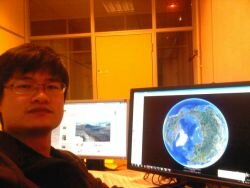 How does a typical working day look like?
How does a typical working day look like?
Stay in office, write codes, read papers, discuss with colleagues...
Funniest response ever when you told somebody that you are a "polar researcher"?
I have not told anybody I am a "polar researcher" yet. But I can test next time.
What are the specific challenges for modelers?
The physical world is too too complex.
What are your plans for the upcoming three / five years?
Keep on doing science.
What are the challenges in cooperating with the field people?
There are maybe no specific challenges, but the modeling researchers should go to the field to feel the real physical world.
PAGE21 Researcher Profiles: Moritz Langer
- Details
- Created on Wednesday, 13 February 2013 16:38
Moritz Langer, a Post-doctoral researcher at the Alfred Wegener Institute in Potsdam, Germany, is this week's PAGE21 young researcher.
Institution
Alfred Wegener Institute
Nationality
German
Research Focus
I study the thermal dynamics of permafrost soils which are controlled by various factors such as the snow cover, the vegetation cover, the soil moisture, and the soil ice content just to mention a few. With my investigations I try to get better insights into the heat transfer processes between the soil and the atmosphere and how they might change under warming climate conditions in the Arctic.
Therefore, we put much effort in measuring the heat and water exchange between the soil, the snow cover, and the atmosphere. We make use of various instruments such as micro-meteorological stations and boreholes which are equipped with temperature and moisture sensors. These investigations are important as many processes in the Arctic ecosystem such as green house gas emissions are directly linked to the stability of permafrost.
It is the aim of my research to identify the dominate processes which must be incorporated into climate models in order to enhance our predictions of the impact of climate change in the Arctic.
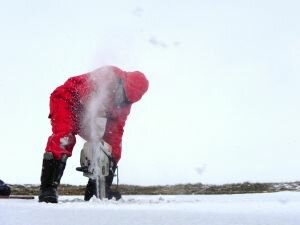 What is the current challenge within this topic?
What is the current challenge within this topic?
It is quite challenging to transfer our observations and processes knowledge into parameterizations that are useful for climate models.
How did it happen that you became a researcher?
I guess this was more like growing into it and not a clear decision.Why do you like being a researcher?
I always liked to figure things out, but most importantly I love the field work that comes with the job.
How does a typical working day look like?
Most of the time I work in my office, but for one or two months of the year I am on expedition to exciting locations in the Arctic.
Funniest response ever when you told somebody that you are a "polar researcher"?
Have you ever kissed a polar bear?What are your plans for the upcoming three / five years?
I hope to delve deeper into the field between field work and modelingWhich expeditions do you participate this year?
I will participate in a field campaign to Samoylov Island in the Lena Delta during April. For my work, the focus of this expedition lies on snow cover properties and on the freeze dynamics of lakes.What do you usually miss the most when being on the field?
During expeditions to the Arctic I usually miss to have a good beer after a long field day.
What will be this years biggest challenges?
This year, the biggest challenges are the new and so far unknown conditions at our field site due to the new research station on Samoylov Island.
PAGE21 Researcher Profiles: Carolina Voigt
- Details
- Created on Thursday, 07 February 2013 09:38
This weeks PAGE21 Young Researcher is Carolina Voigt from the University of Eastern Finland.
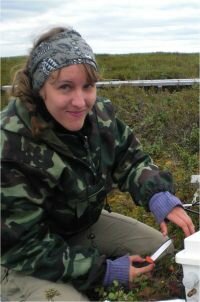 Name
Name
Carolina Voigt
Institution
University of Eastern FinlandNationality
GermanResearch Field
Investigating the effect of climate warming on CO2, N2O and CH4 flux dynamics and underlying processes in subarctic tundra ecosystemsWhat is the current challenge within this topic?
Peatlands, especially those located in the highly sensitive arctic and subarctic latitudes, are known to play a major role in the global carbon cycle. Predicted climatic changes – entailing an increase in near-surface temperature and a change in precipitation patterns – will most likely have a serious yet uncertain impact on these ecosystems. Higher temperatures in combination with increasing thawing-depth as well as changes in the site-specific hydrologic regime will result in drastic alterations of the structure and function of these "bionetworks". Due to the complex nature of those ecosystems and interactions between various internal processes, many aspects remain unclear.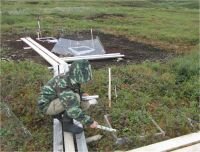 How are you affiliated with the PAGE21 project / what parts of your research will be a direct input to PAGE21?
How are you affiliated with the PAGE21 project / what parts of your research will be a direct input to PAGE21?
My fieldwork is done in the PAGE21 research site Vorkuta/Seida in the Russian Arctic and is embedded in WP4 (acquisition of carbon, nitrogen and greenhouse gas flux data).
How did it happen that you became a researcher?
During my studies I did several internships at different research institutes. That is when I decided I would like to work in that field.Why do you like being a researcher / What do you like most in being a researcher?
I like scientific work, the internationality and having the opportunity to go to places that you would never visit in "normal life"How does a typical working day look like?
A typical working day in the field starts off right after an early breakfast with preparations of the measurements. Usually the measurements take the whole day and, depending on the size of the team in the field, different measurements are done at the same time. In general, working days in the field tend to be too short, because there are always things that need to be done. As there is quite tough physical work most of the days, people in the field are usually always hungry. And it is not a typical working day without the daily portion of pancakes ;-)What are your plans for the upcoming three / five years?
To finish my PhD thesis.Which expeditions will you participate this year and what is going to be their focus?
The summer 2013 will be spent in our research site Seida, where we will hopefully be able to acquire a full dataset for this year's growing season.What do you usually miss the most when being on the field? What has been your most interesting experience so far on expedition?
What I guess most of the people who go to our field site are missing the most a shower, especially after a hot working day with a lot of mosquitoes. The best experience in the field for me was probably the realization that despite some hardships you get accustomed to the everyday field conditions after only a short while. I for my part am already looking forward to return to Seida next summer.
PAGE21 Researcher Profiles: Benjamin Runkle, University of Hamburg
- Details
- Created on Wednesday, 30 January 2013 17:18
Ben Runkle is next in line in our researcher profile series. He is post-doctoral researcher at the University of Hamburg.
 Name
Name
Benjamin Runkle
Institution
Institute of Soil Science, University of Hamburg, Germany
Nationality
American
Research Field
I study the interactions between water and the carbon cycle by quantifying lateral and vertical fluxes of both water and carbon. The lateral fluxes are the movement of surface water over the permafrost tundra and the dissolved carbon it contains, while the vertical fluxes involve the uptake of CO2 by plants as they photosynthesize and the release of CO2 and methane (CH4) by soil microbes as they respire. Understanding key controls of these fluxes helps to make better model projections so we can better clarify the role of climate change on the great stocks of frozen carbon in the permafrost. The field parts of this research occur at Samoylov station, which is in Russia's Lena River Delta.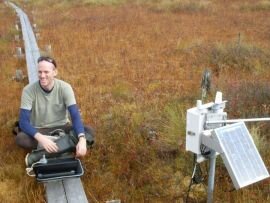 How are you affiliated with the PAGE21 project and what parts of your research will be a direct input to PAGE21?
How are you affiliated with the PAGE21 project and what parts of your research will be a direct input to PAGE21?
The flux measurements are a key part of working group 4's mission to quantify the exchange of greenhouse gases between the landscape's surface and the atmosphere.
What is the main challenge within this topic?
It is a challenge to provide continuous measurements from harsh northern environments. The summer growing season is relatively easy to measure, but the winters are more difficult. Fortunately the fluxes during this time are lower, but their exact behaviour requires more research.How did it happen that you became a researcher?
I am a researcher because I love exploring how nature works and why. I'm particularly interested in providing information about landscapes that can be of use for policymakers and others who guide the way our civilizations operate.Why do you like being researcher?
I love both the independence of working on a scientific question as well as the teamwork necessary to resolve it. One great thing about the summer research experience is to work at a research station with scientists from many fields and places. You learn so much from observing others and discussing their results in the context of your own work. It is so inspiring.What do you like most in being a researcher?
I like the moment when you see a pattern that was previously hidden within the data. It is so fulfilling to see a hypothesis borne out by the measurements.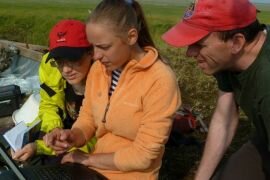 How does your typical working day look like?
How does your typical working day look like?
No one day is the same, but the general pattern is to work on my own data analysis and writing, then have a meeting or discussion with one of the students I mentor, then to talk about some findings or logistical questions with my research group leader. I often also make phone calls about equipment orders and check on the progress of something in the laboratory.
What is the funniest response you have had when you told somebody that you are a "polar researcher"?
Everyone finds going to work in Siberia to be funny. They expect to hear that I'm being punished for some crime. I love the landscape there and think it's a real treat to work in such a remote and vast place.What are your plans for the upcoming three / five years?
We have a lot of work to do to understand the connections between different landscape types. I hope to contribute to this by doing a mix of field work and modeling of our results.Which expeditions do you participate this year and what will be their focus?
This spring I go back to our Samoylov station to gain data on the snowmelt season and its processes. This is a period which is very exciting from a hydrological perspective – on the island where we work the snow will melt within a month's time, and all this water will leave the site through overland flow. The island is surrounded by branches of the Lena River in its delta, and the ice melt and subsequent flood will be dramatic to observe – there can be large rises in the river level overnight (5 m or more).What do you usually miss the most when being on the field?
This past summer, I missed having Nutella and peanut butter, both of which I associate with tough outdoor work. I may sneak them into my luggage the next time around.
What has been the biggest challenge for you on your field trips?
Observing your responses to the polar day is really interesting and new – there's no real way to imagine how this phenomenon acts on your body's rhythm without experiencing it first-hand. It's a great boost of energy just in time for all the data collection work. I would be less eager to experience the polar night – it must be quite tiring!PAGE21 Researcher Profiles: Chloé Largeron, LGGE
- Details
- Created on Tuesday, 22 January 2013 14:34
This week we introduce our first modeler, Chloé Largeron, from the Université Joseph Fourier, Grenoble.
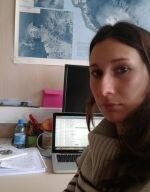 Name:
Name:
Chloé Largeron
Institution:
Laboratoire de Glaciologie et Géophysique de l'Environnement (LGGE), Université Joseph Fourier, Grenoble
Nationality:
French
Research Field:
I am a modeler on a land surface model called ORCHIDEE
What parts of your research will be a direct input to PAGE21?
I focus on dissolved organic carbon processes in permafrost area on the ORCHIDEE model
What is the current challenge within this topic?
The challenge is to make projections of the emission of carbon into the atmosphere due to the thawing of permafrost until the end of the 21st century.
How did it happen that you became a researcher?
I've studied physics in the university and would make a PhD in the field of the global warming
Why do you like being the researcher?
I like it for many reasons and one of them is to be constantly informed of new research.
What do you like most in being a researcher?
I like to be in contact with other researchers
How a typical working day looks like?
Sitting in front of computers :-)
What are the challenges for modelers?
The challenge is to get the best representation of the reality as possible and to parametrize physical processes.
What are your plans for the upcoming three / five years?
To do my PhD at first and to continue in the research perhaps as a PostDoc.
What is the usual response when you tell somebody that you are researcher in the field of climate modeling?
The usual response is "are you already been there, to see toundra, wetland, permafrost area,..."



